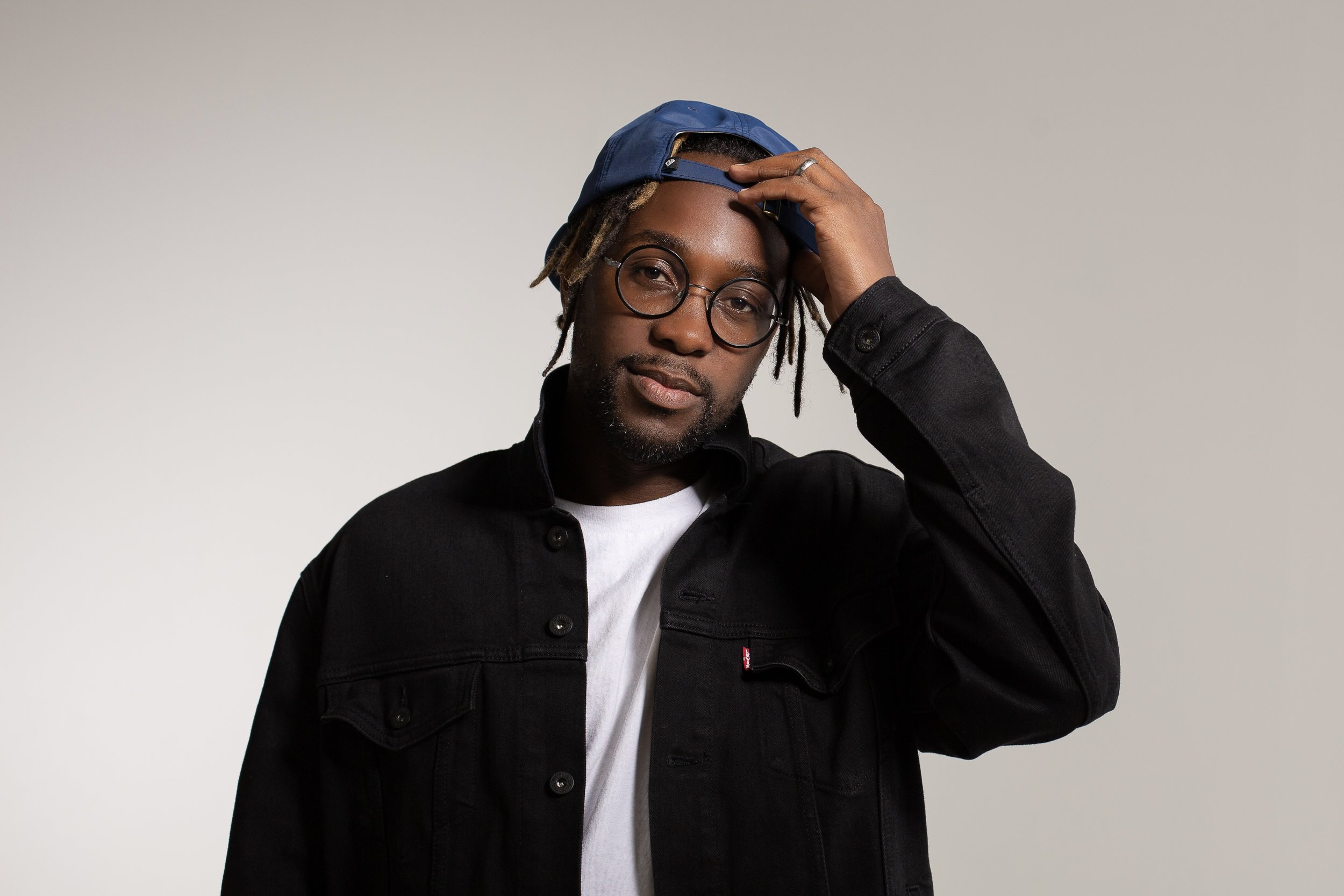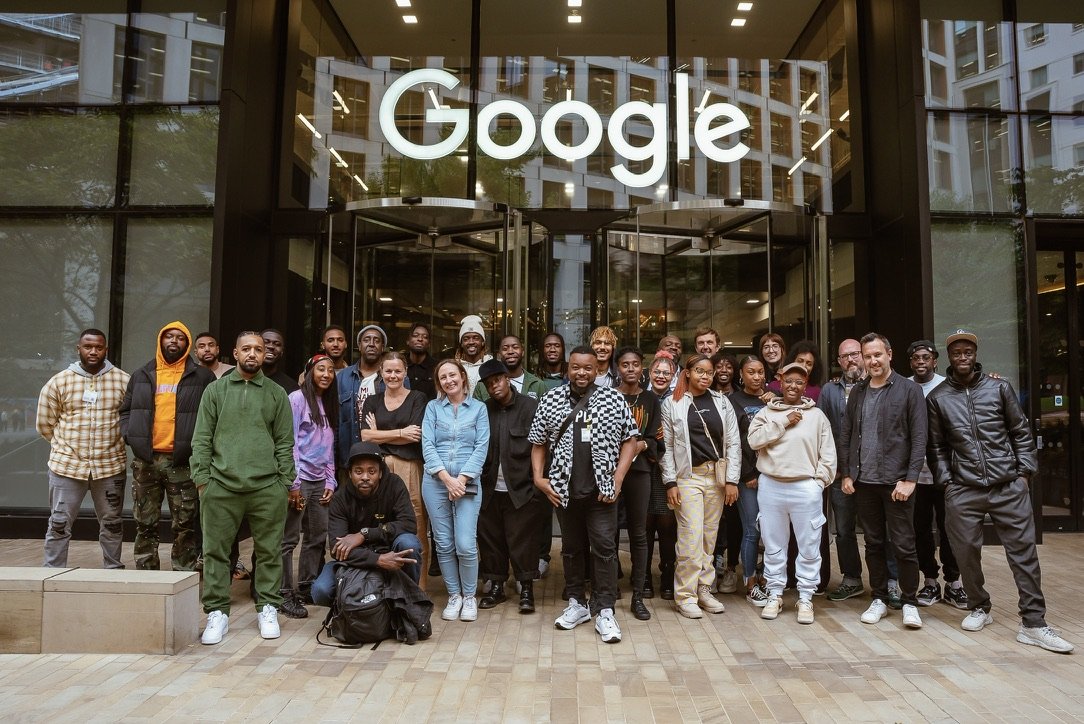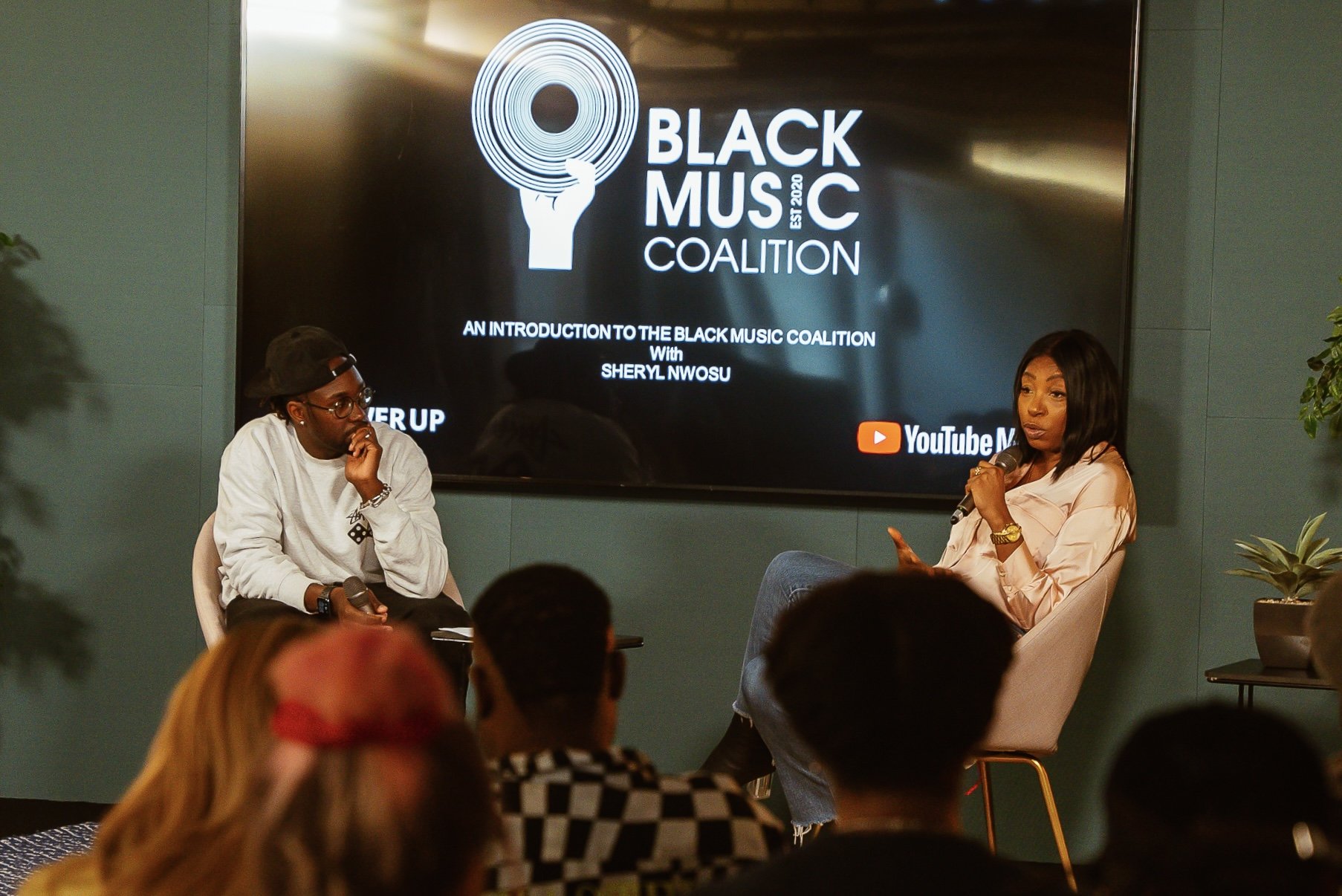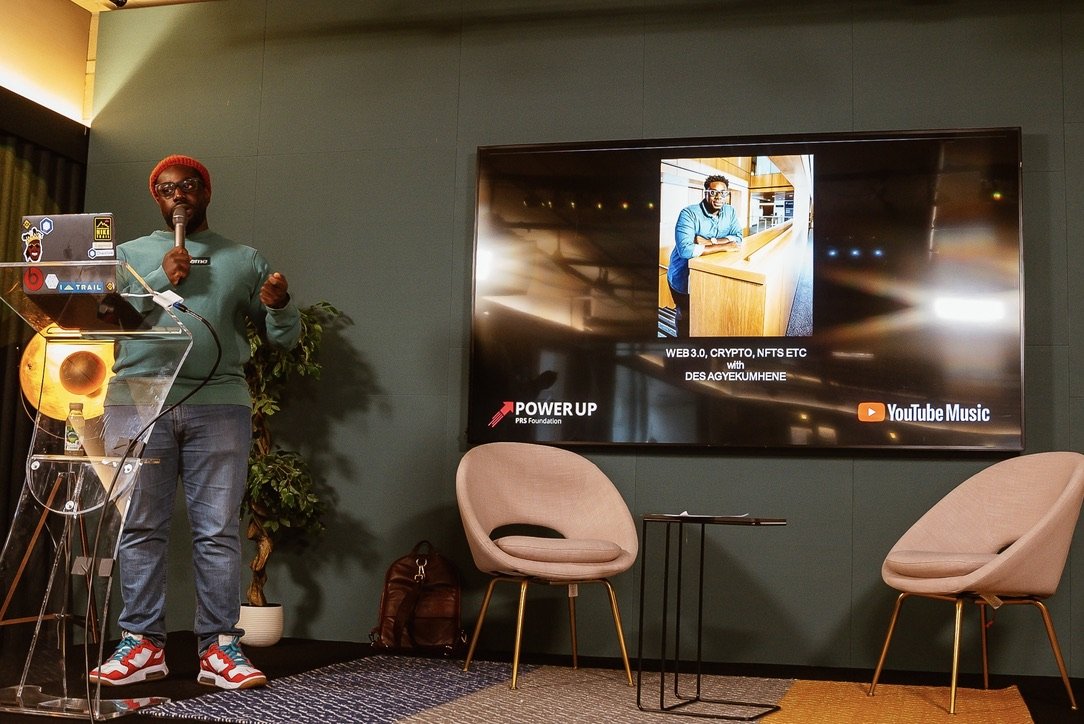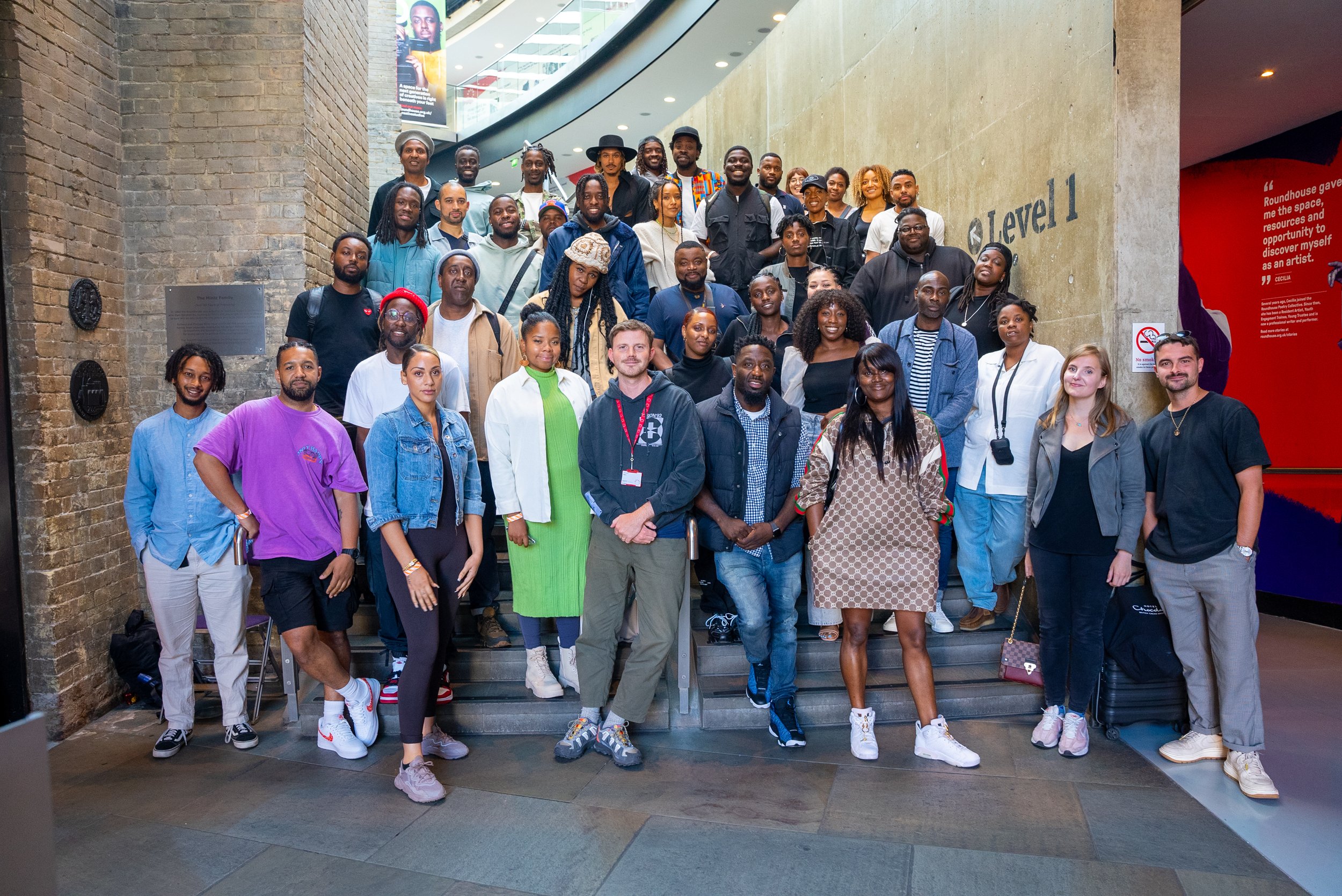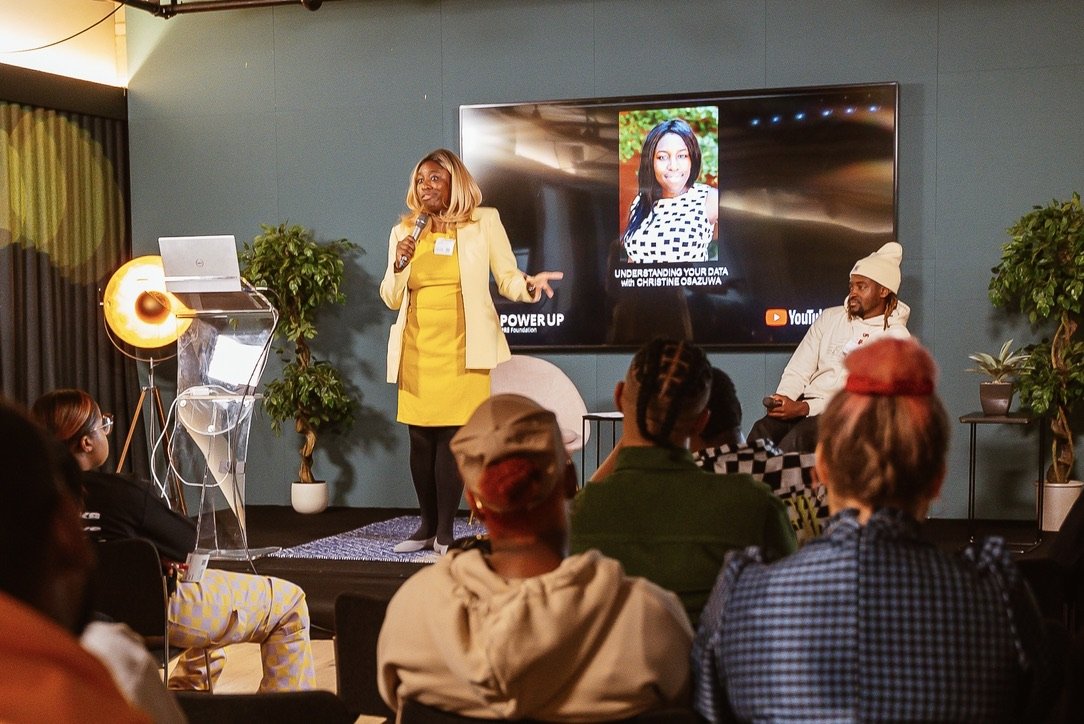FAC Insights: Interview with Yaw Owusu
FAC Insights is a forum for us to showcase and share long form pieces looking at various parts of the music industry and the society that shapes it. Pieces take the form of videos, interviews, discussions, articles and more.
To mark Black History Month, we spoke to Yaw Owusu, a Liverpool-based creative consultant. He builds projects that integrate music, culture and content production that deliver long-term impact for creatives, brands, organisations and communities. He believes that the empowerment and platforming of under-represented voices, cultures and stories strengthens and bolsters the art, media and culture we consume.
Our paths crossed with Yaw In 2020, when he began working with PRS Foundation to develop and design POWER UP (PU); a new and pioneering initiative that empowers Black music creators and executives in response to the conversations generated by the Black Lives Matter movement. At the beginning of 2021, Yaw was appointed as Senior Manager, where he not only leads POWER UP but integrates its learnings across the PRS Foundation. and actions across the organisation. In addition, he designs and oversees the Power Up Participant Programme, annually elevating 40 exciting Black music creators and industry professionals, breaking barriers for those at crucial career stages through grant support, networks, mentoring, masterclasses and more. POWER UP partners include the Featured Artists Coalition, YouTube Music, Spotify, Believe Digital and Beggars Group, among others.
1.Tell us about yourself, your background and your career.
I am Yaw Owusu. I work as a creative consultant specialising in the strategic design, development and delivery of music and music culture projects, programmes and initiatives that integrate music, culture and content production that deliver long-term impact for creatives, brands, organisations and communities. I started doing this work over 15 years ago and have worked with the likes of Google, MTV, BET, MOBO, BBC, Universal Records, Levi’s, Warner Music, Liverpool Football Club, The Fader and more. I have also helped launch and develop the careers of multiple artists and have produced several radio, television and documentary projects for various platforms including BBC Radio and TV.
Currently, I am creatively directing and managing the programmes for the award-winning POWER UP (PRS Foundation), Liverpool International Music Festival (LIMF), leading music talent development initiative LIMF Academy, an R&B Tour spearheaded by 1Xtra’s Ace, Liverpool Against Racism festival for the Mayor of Liverpool’s office, a special soon to be launched project for Google and a few other good things.
I also serve as a board member for the Liverpool City Region Music Board and Black Music Action Group and leading music talent and digital sector development organisation, Generator NE.
2. How and why did you get involved with PU?
Let me start off with the why - I have been involved in pushing for equality and equity for under-represented and often unheard music creators and industry professionals in the music industry for my whole career - whether that’s based on race, genre, gender, locations or whatever. A lot of my work has been done as part of wider, perhaps more mainstream activity, but that has always been a thread. When I heard what the founders of POWER UP, Joe Frankland and Ben Wynter, were developing I was so excited. It was fully focused and clear and I felt like I could definitely contribute not just based on my own personal experiences as a Black industry professional, but my experience developing and managing initiatives, my approach and perspective and the opportunity to work closely with great leaders and visionaries like Joe and Ben. It was a no-brainer.
I was brought in 6 months ahead of the launch to undertake substantial research and development which included the setting up of the Power Up Executive Steering Committee in late 2020 to strategically steer the initiative and engaging with more than 80 Black music executives and creators to contribute and steer Power Up through a series of focus groups covering recording and publishing, live, platforms, gender, sexuality, enterprise and regionality. After the R&D process, I took on the role of Senior Manager, where my main responsibilities included designing and managing the delivery of the programme to ensure it responded to the barriers facing Black music creators and Black industry professionals in the UK music industry, as well as chairing the POWER UP Executive Steering Committee.
Power Up is an ambitious, long-term initiative launched in 2021 which supports Black music creators and industry professionals and executives, as well as addressing anti-Black racism and racial disparities in the music sector. Managed by PRS Foundation in partnership with YouTube Music, Beggars Group and the Black Music Coalition, the initiative brings together several music industry partners across all sectors to accelerate change. Supporters include AIM, the BPI, the FAC, The Ivors Academy, the MMF, the MPA, MPG, The Musicians’ Union, PPL, PRS for Music and the PRS Members’ Fund who bring added-value support to power up participants. Power Up Ambassadors include MC and actor Kano; award-winning BBC Presenter and Music Entrepreneur DJ Target; Disturbing London Founder Dumi Oburota; artist Ray Blk; GRM Founder Post.
Through a holistic Power Up Participant Programme and the Power Up Movement it breaks down barriers to create:
A fairer, more equitable music industry for Black creators and industry professionals
Better representation in all sectors of the UK music industry
To support innovative and exciting Black talent to create exceptional new music in all genres and at all career levels
To amplify the work of Black creators and industry professionals to accelerate change
2. Are there any highlights you can tell us about from Power Up programme?
There have been so many highlights and memorable moments. For me, on a basic level, a big highlight was actually working on the pre-launch activity - especially as we developed the offer and shared it with experienced Black music creators and industry professionals, our targeted ambassadors and ESC members. Seeing the reaction - and on the back of it the commitment to support POWER UP - was so inspiring and really energising. Then when we announced publicly, the sheer amount of applications from Black professionals across the various sectors of the industry was incredible. I am super proud that we have been able to support 80 amazing Black music professionals directly and many more through our partnership work. I am also proud that over half have been women or gender minorities, about 50% have been from outside of London and that we have covered pretty much all genres and professions.
In terms of, I suppose, programme wins/highlights/achievements, there are so many but here are just a few:
Two-piece band Nova Twins won a Heavy Music Award, toured the US and Europe (including supporting Bring Me The Horizon), signed to Marshall Records and have secured BBC Radio 1, NME and Spotify Equal support globally. Their POWER-UP supported second album Supernova is nominated for the Mercury Music Prize and they won a 2022 AIM Award
Adem Holness has been appointed Head of Contemporary Music at the Southbank Centre
Ego Ella May won Vocalist of the Year at the Jazz FM Awards
Vocal coach and talent developer, Jennifer John won an AIM Award
Christine Osazuwa has been appointed as Chief Strategy Officer at Shoobs and became UK Director of shesaid.so. She also became a Women in Music Awards’ Roll of Honouree in 2022
Glaswegian artist, DJ and producer, TAAHLIAH won an AIM Award
Des Agyekumhene’s company Soga were behind the Close To Home NFT campaign for Aitch– the first artist to claim an NFT entering the UK’s official album charts
Daniel Kidane was involved in the BBC Proms 2021 and his new work Sun Poem was premiered in 2022 with the LSO and Sir Simon Rattle performances across the UK and Europe garnering critical acclaim
Abel Selaocoe took part in the Proms in 2021 and 2022, signed to Warner Classics, presented the three-part BBC Radio 3 show Cello Retold, and his debut album hit Number 4 in the Classical Album Chart
Bemz’ album made the SAY (Scottish Album of the Year) longlist
DoomCannon’s debut album (part-funded by POWER UP and released on Brownswood) was released over the summer, garnering universal acclaim
Tawiah’s live return at the Southbank Centre for In The Black Fantastic was sold out, and her album Eartha will be released at the end of 2022
Forward Slash founder Keturah Cummings was selected for the 2022 Barclays Black Founder Accelerator programme and launched new podcast Jack of All Trades
And certainly by no means least, POWER UP was selected as the inaugural recipient of IMPALA’s new Changemaker Award which aims to put the spotlight on projects that promote change in the independent sector and inspire others to take action. The award helps to promote equity, diversity and inclusion in the music sector across Europe.
3. What do you think are the main challenges or areas of improvement for the industry today when it comes to diversifying the creative sector of the music industry?
There are a lot of challenges and areas to improve. Some very specific, for example around streaming reform - which POWER UP co-founder Ben Wynter has been doing lots of work to ensure there’s true equity in that space, but also some very large things. For example, sustaining the interest is at the forefront of conversation right now. It’s been over two years since #BlackOutTuesday and a lot of the pledges by companies in the music industry to change things for the better for Black music creators and industry professionals. Positive steps have been made but sustaining that energy and focus I think is a real challenge. I believe many thought it would be quite linear, simple and perhaps quick. But it was never going to be. The equalities are so deeply entrenched that this commitment to ensure equality and equity for Black professionals throughout the industry is going to take a long time. I hope everyday that the commitment continues to be there and the hard work is done. It’s not pretty but it is necessary.
From my perspective, particularly from a POWER UP programme perspective, I see the growth in opportunities for some, but I know the continued focus on those at POWER UP level is about opportunities at critical career points. The talent is there and is amazing. So it is not entry level opportunities that are sought, but opportunities at levels where they can really impact and influence in their sector whether that’s at as an employee or an entrepreneur or creative. The more this occurs the bigger the ripple effect. So that’s why we really focus on the programme supporting those at that level and through our holistic programme we try to make sure those opportunities are shared and we support those who are doing work at that level.
Tying into this, another area I think we need to be very clear on is that the result can not just be measure by numbers alone. We have seen some companies release figures on diversity in their workplace and we need to be careful that like some other industries, we don’t get caught up in a growth in the number of ‘diverse employees’ when ofttimes that growth is at entry level. We need to make sure we see growth in the ‘higher level’ opportunities AND we want to look deeper and know that Black people in this industry are being treated better too.
Again, as an extension to this, we should also be keeping an eye of intersectionality - because we know the statistics show that Black women for example, are treated worse in this industry than Black men, not to mention White men. When we place other variations, such as locality, sector, sexuality and disability, we know it gets worse for Black people. So we need to ensure that this is front and centre of any work around powering up Black people in the UK music industry.
4. We believe it's important to highlight the positives, which is why we wanted to speak to you and highlight all you do, however can you name other great industry initiatives that are doing a great job?
There’s so many great initiatives working to deliver change. Some specialist independent organisations, some independent and non-specialist and some groups within corporations pushing for and making dramatic change. But to name a few, I must say what the Black Music Coalition have done by galvanising the collective industry power of its members to make a real statement of solidarity on the industry frontline at such an early stage was special and really set the tone. It has been really great to see how they have started to develop programmes and events, alongside their direct campaigning, to really uphold and celebrate the culture than drives so much of the UK Music Industry. So I must big up that team over there. It has been great to have their support as a partner of POWER UP since basically day one.
Then of course Black Lives In Music. From their game changing survey and report, to their continued positively disruptive presence across particularity the Jazz and Classical space, it has been inspiring to witness. What I love about their approach - and why I think it has been super powerful and impactful - is that they have focused on data, which has been used to PROVE the disparities that need to dealt with and now they are at the stage where they are able to put real targets together for organisations and measure their performance against those targets and stats. The next stage they have planned is going to shake things up even more.
Anytime you talk about diversity and inclusion in the music industry we must salute the great work by UK Music Diversity Taskforce because they have been looking at the issues for a long time and using their influence and position to make the industry pay attention and respond positively to guidance.
Locally (for me), I sit on the Liverpool City Region Music Board and we set up a Black Music Action Group of 12 members and in such a short time we have done some really good work in a region which has had a up and down past when it comes to race relations and historically hasn’t performed well in terms of supporting, platforming or celebrating it’s Black music talent - both on stage and off. The Black Music Action Group created a manifesto, which has been quickly adopted and has gone on to ring-fence nearly £350K to support Merseyside-based development opportunities for Black music creators and industry professionals and support the business development of Black-led music organisations over the next 18 months. This has been informed by the results from an in-depth survey and corresponding report that focuses on the Black experience within the regional music industry. It is a game changer for the Liverpool City Region.
5. What is the one piece of advice every artist and executive should know when they come into the industry?
This is not to be romantic but I fully believe there’s a place for everyone’s input in the music industry. I think we are at a time that to have impact you don’t have to be the stereotypical music mogul in the corner office, or be the Top 10 artist or have to act a certain stereotypical way to succeed in this industry. I think you can come as you are, with your unique professional or creative USP and by being great at it you can have a long and impactful career in this industry. I see that everyday with our POWER UP participants in particular. All are wonderful people, who deliver excellence in so many areas, buck the trend and are reaping the rewards! It’s exciting. And with the support that we are seeing for dynamic and innovative work and approaches, especially from those from diverse and under-represented groups, I think there is a real positive shift happening.
6. Where and how do you envision the UK Music industry 10 years from now?
I would hope that in 10 years, the programmes and initiatives that HAVE to happen right now in order to push diversity and inclusion in the industry will be obsolete because they have all achieved their aims and we have it embedded true diversity and inclusion in every area of our industry. I hope we see diversity in every way - including thoughts and approach - at all levels. And because of that this industry that we love and that provides such joy to the end user will be thriving and is innovating and valuing and providing fair value for ALL its creators, creatives and members the way it should. I want it to be in a place where we would encourage anyone we love and care for to work in this industry.
7. At the FAC, we of course love to celebrate artistic talent - can you tell us about one artist that you loved from growing up, one that has had a lasting impact on your music taste and one that we should all watch in the future?
You saved the hardest to last but here goes:
Growing Up - Jay-Z. I listened to a lot of Hip-Hop from probably aged 7 (blame my older cousin - although I tend to thank him) so everything from Ice Cube, 2Pac, Dre, Snoop, LL Cool J, De La Soul etc etc but I wasn’t turned on to Jay-Z until In My Life Time…Vol 3. But when I really connected to his message and purpose, I was sold. So not only is he uniquely skilled as a lyricist and a song-writer, but the message is one that is empowering, inspirational and aspirational. I think his ability to do that continues to magnify.
Lasting Impact on my music taste - Bob Marley. My Mum is Jamaican so there was a lot of Reggae in the house growing up but I really fell in love with his music, message and his vision and his commitment to those three things about 10 years ago when I went really deep into his work. I’ve always felt that the ideal music artist, song and genre should be bigger than just formula or surface level stuff. I think Bob Marley epitomises the perfect execution of it all. He opens the mind and heart with his words and music. He is a true unifier. He also opened a window to a culture (and a country) so everyone could see in. That’s incredible. Anytime I connect with a new artist, it’s because they display those things which he exemplifies. Any artist I have worked with, definitely has had those traits in some measure too.
Watch In The Future… I’m going to pick 3 from my hometown of Liverpool… just because I’m hoping they are under the radar, and they are all non-POWER UP so no bias…
Girls Don’t Sync - an incredible DJ collective that are smashing stages all over the world. I feel they are almost rock stars rather than DJs (just watch a live set and you will understand). They are four females - 2 from Liverpool, 1 from Manchester and 1 from London and are great. Even though they aren’t ‘artists’ yet (watch this space though), they are formidable.
Michael Aldag - a unique artist from Liverpool, who writes these songs about teenage life that on first listen sound sometimes boastful or egotistical and then you listen again and realise it is incredible satire and wit bulging out. All the same they are ear-worms that are beautifully performed by the kid with a great voice and wonderful presence on the mic and on stage. I’m a fan. He is signed to 3Beat / Universal Records. Check out his new song, Okay.
KOJ - a Grime artist from Liverpool, who represents that in its truest sense. He has a depth to his work that is transcends his age or any stereotype people might have. He is super smart, driven and clear with his purpose. There are so many stories behind certain lines in his music so I am looking forward to his output and unpicking more. Song to check out is Blue Notes.

